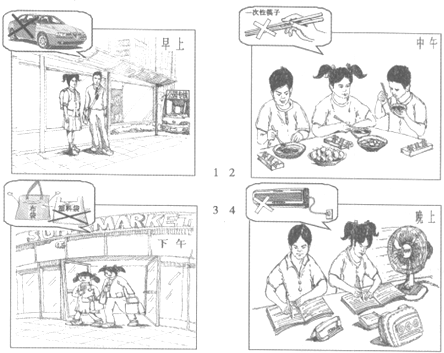题目内容
14. 请你仔细观察右侧图片,写一篇120字的短文.你的短文应包括下列要点:
请你仔细观察右侧图片,写一篇120字的短文.你的短文应包括下列要点:1.简单叙述图片中的内容;
2.谈谈父母对你的期待;
3.你的看法和对将来的打算.
注意:短文的开头已给出(不计词数)
(请在边框内规范答题,超出边框外的答案无效.)
As is shown in the picture above, .
分析 高分句型:
句型一:
Qualitied education ①is the first wise choice,which②later makes a promising future.
素质教育是首要的明智选择,以后它会制造出一个充满希望的未来.
①qualitied education 意为:素质教育.
②本句为非限定性的定语从句,关系代词which指代先行词 choice,在该从句中作主语.
句型二:
To live up to my parents'dreams①,I will make every effort to②be a wise learner and a brave discoverer in the future.
为了实现父母的梦想,未来,我将尽一切努力成为一个聪明的学习者和一个勇敢的发现者.
①To live up to my parents'dreams为动词不定式短语作目的状语,表示将要完成的动作.
②make every effort to意为:尽一切努力做(某事).
解答 As is shown in the picture above,different parents have different expectations of children.Some parents are rich but they don't have much education.So they hope that their children can go to college to be well-educated.For some,things are just the opposite.They want their children to make money.(首先简述图片的内容)
My parents,though they are poor,don't wish me to make money at an early time.They say school education is vital for a poor family.Qualitied education is the first wise choice,which later makes a promising future.【高分句型一】(结合自己,介绍了父母的期待)
I'm completely for what my parents expect of me.I believe wisdom in the mind is better than money in the hand.(表达自己的看法)To live up to my parents'dreams,I will make every effort to be a wise learner and a brave discoverer in the future.【高分句型二】(介绍自己将来的打算)
点评 本题提供的是图画,主要考查考生的观察力、思考力以及表达能力;因此要求考生应结合题目的要求,看懂了意思之后再进行写作;具体做法是:首先,根据图画内容整理出几个要点,再根据这些要点决定要采用的语言形式,包括确定文中的人称,时态以及选用相应的句式结构,并且还要写出自己的看法或感受.

 新课标快乐提优暑假作业陕西旅游出版社系列答案
新课标快乐提优暑假作业陕西旅游出版社系列答案-That's OK,there's _______.( )
| A. | no problem | B. | no wonder | C. | no doubt | D. | no hurry |
Every culture has its own unwritten list of behavior that is acceptable.Every society also has its taboos,or types of behavior that are considered a violation of good manners.
The word taboo comes from the Tongan language and is used in modern English to describe verbal and nonverbal behavior that is forbidden or to be avoided.(71)C They tend to be specific to a culture or country,and usually form around a group's values and beliefs.What is considered acceptable behavior in one country may be a serious taboo in another.
Verbal taboos usually involve topics that people believe are too private to talk about publicly,or relate to one's manner of speaking.In many cultures,for example,it is considered bad manners to discuss subjects such as sex or religion in public.In some countries,the volume (音量) of one's voice may annoy people.(72)F
(73)A For example,one of the biggest differences among many Western,Asian,and African cultures is the use of eye contact (接触).In the US,people make eye contact when they talk to others.(74)G In many Asian and African cultures,however,children are taught to lower their eyes when talking to their elders,or those of higher rank,as a way to show respect.
Certain gestures made with the hands can have very different meanings depending on the country you are in.Crossing your middle finger over your forefinger is the sign for good luck in many western countries.(75)B Also,in some Asian countries,moving your hands a lot while talking,or‘talking with your hands',is considered unsuitable.
Behavior that is acceptable and non-offensive in one culture can be highly offensive in another.When visiting a foreign country,be aware of some of the basic differences,as this will help to ensure a more enjoyable trip.
| A.Nonverbal taboos usually relate to body language. B.In Vietnam and Argentina,however,it is a rude gesture. C.In spite of what some people may think,taboos are not universal. D.Cancer is a taboo subject and people are frightened to talk openly about it. E.Learn a country's customs so that you don't hurt the local people unconsciously. F.They might think that someone who is speaking or laughing loudly is rude or aggressive. G.If a person avoids eye contact,others might think they are being dishonest or unconfident. |
